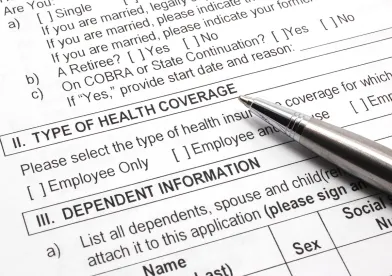One important question that arises when determining whether an individual is eligible for the COBRA premium subsidy under the American Rescue Plan Act of 2021 (“ARP”) is whether the employee has experienced an involuntary termination of employment. (See our prior blogs on the ARP subsidy, here.) The IRS’s recent Notice 2021-31 (the “Notice”) provides helpful guidance on this issue.
What is an Involuntary Termination?
One of the key interpretive questions under ARP is “what is an involuntary termination of employment”? Given the various factual circumstances that could arise, it is not surprising that this is one of the most frequently asked questions. The Notice helps define an involuntary termination of employment, and in many respects follows previous IRS guidance relating to the 2009 federal COBRA subsidy.
Under the Notice, the basic principle is that an involuntary termination means:
-
a severance from employment;
-
due to the independent exercise of the unilateral authority of the employer to terminate the employee’s employment, other than due to the employee’s implicit or explicit request;
-
where the employee was willing and able to continue performing services.
In the end, the determination of whether a termination is involuntary is based on all the facts and circumstances. Even if a termination is labeled as “voluntary” or is designated as a resignation, it won’t necessarily be voluntary for ARP purposes. The Notice explains that such a termination will be involuntary if the circumstances indicate that the employee was willing and able to work and, absent the employee’s termination, the employer would have terminated the employee and the employee had knowledge of that. Here are some example scenarios from the Notice.
Termination for Cause
A termination by the employer for cause is an involuntary termination. However, if the employee was terminated due to gross misconduct, there will not be a COBRA qualifying event (and, thus, no subsidy).
Employee-Initiated Terminations
An important point made in the Notice relates to employee-initiated terminations. The Notice clarifies that even an employee-initiated termination will be considered involuntary if the employee leaves their job for “good reason” due to an employer action that caused a material negative change in the employment relationship for the employee, akin to a “constructive discharge.” The Notice provides examples such as terminations in response to an involuntary material reduction in hours, and a material change in the geographic location of employment.
The Notice makes clear, however, that an involuntary termination generally does not include a termination by the employee due to: (i) concerns about workplace safety, (ii) personal circumstances such as a health condition of the employee or a family member, the inability to locate daycare, or similar issues, or (iii) the inability of a child to attend school or because another childcare facility is closed due to the COVID-19 pandemic (though in that case the termination may qualify as a reduction in hours if the circumstances indicate that it is a temporary leave of absence and the parties intend to maintain the employment relationship. An employee’s death also does not qualify as an involuntary termination for ARP purposes.
Absence Due to Illness or Disability
According to the Notice, absence from work due to illness or disability is not an involuntary termination for ARP purposes (though the individual may qualify for the premium subsidy if they lose health coverage due to the reduction in hours of employment). However, an involuntary termination will occur if the employer takes action to terminate the individual’s employment while they are out on disability, if, prior to the termination, there was a reasonable expectation that the employee would return to work after the illness or disability had subsided.
Participation in a Window Program
Involuntary terminations also include situations where an employee with an impending termination participates in a window program, in which the employee is offered severance in exchange for agreeing to terminate employment within a specified time period. The Notice provides that, for this purpose, the window program must meet the requirements for such programs under the relevant IRS regulations.
Limited duration contract/seasonal employees
Some employees work under a limited duration employment agreement. For example, an employee might be hired for a six-month period, or for a particular season. In these cases, the question arises as to whether reaching the end of that period means that there has been an involuntary termination of employment.
As a general rule, the IRS view is that an employer’s decision not to renew an employee’s contract will be considered an involuntary termination if the employee was willing and able to continue the employment relationship and willing to execute a new contract with similar terms or continue without a contract. However, in a slight departure from the 2009 COBRA subsidy rules, the Notice provides that if the parties understood at the time they entered into the contract, and at all times while the services were being performed, that the contract was for specified services over a set term and would not be renewed, the completion of the contract without it being renewed is not an involuntary termination.
Retirement
The IRS’ general view is that a retirement is not an involuntary termination. However, if the facts and circumstances indicate that, absent retirement, (i) the employer would have terminated the employee, (ii) the employee was willing and able to continue employment, and (iii) the employee had knowledge that they would be terminated, the retirement will be considered an involuntary termination. Moreover, in many cases, to “retire” simply means that the employee has met certain age and service conditions at the time of a termination of employment. So, if the employer terminates an employee who meets the applicable age and service requirements, the employee could retire, but still was involuntarily terminated.
More to Come
Even with the issuance of IRS Notice 2021-31, there are many unanswered questions that arise in connection with the ARP COBRA premium subsidy, particularly related to eligibility for the subsidy and the tax credit. Stay tuned for important updates on these issues.





 />i
/>i
